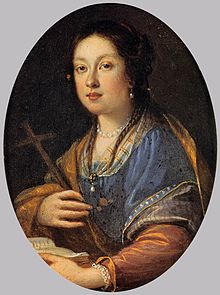Margherita de’ Medici
| Margherita de' Medici | |||||
|---|---|---|---|---|---|

| |||||
| Duchess of Parma and Piacenza | |||||
| Reign |
11 October 1628 – 11 September 1646 |
||||
| Regent of Parma and Piacenza | |||||
| Reign | 1646–1648 | ||||
| Co-Regent | Francesco Farnese | ||||
| Born |
31 May 1612 Palazzo Pitti, Florence |
||||
| Died |
6 February 1679 (aged 66) Parma |
||||
| Spouse | Odoardo Farnese, Duke of Parma | ||||
| Issue |
Ranuccio II, Duke of Parma Prince Alessandro |
||||
| |||||
| House | Medici | ||||
| Father | Cosimo II de' Medici | ||||
| Mother | Maria Magdalena of Austria | ||||
| Religion | Roman Catholicism | ||||
| Full name | |
|---|---|
| Margherita de' Medici |
Margherita de' Medici (31 May 1612 – 6 February 1679) was Duchess of Parma and Piacenza by her marriage to Odoardo Farnese, Duke of Parma. Margherita was regent of Piacenza in 1635, and regent of the entire duchy from 1646 until 1648 during the minority of her son.
She was the fourth of eight children and the second daughter born to Cosimo II de' Medici, Grand Duke of Tuscany and his wife Maria Magdalena of Austria. Hence Margherita is a descendent of the Holy Roman Emperors.
Margherita became engaged to Odoardo Farnese, Duke of Parma in 1620. They married in 1628 when he came of age. The marriage had been strongly desired by Odoardo's father, Ranuccio, who saw it as a means of strengthening the alliance between the Duchy of Parma and the Grand Duchy of Tuscany, then ruled by the Medici family.
The marriage took place in Florence on October 11, 1628 in Florence. The wedding celebrations were accompanied by much spectacle and pagentry, including the performance of Marco da Gagliano's opera La Flora, composed especially for the occasion. To welcome the couple back to Parma, Mercury and Mars, with music by Claudio Monteverdi and text by Claudio Achillini was performed in the Teatro Farnese.
The years in which the couple ruled over Parma were marked by the plague of 1630 and the contrast between the splendor of the court and the tax burden to which they had subjected their subjects. The tax money was used to improve Odoardo's armies. The Duke also had a pro-French policy.
...
Wikipedia
